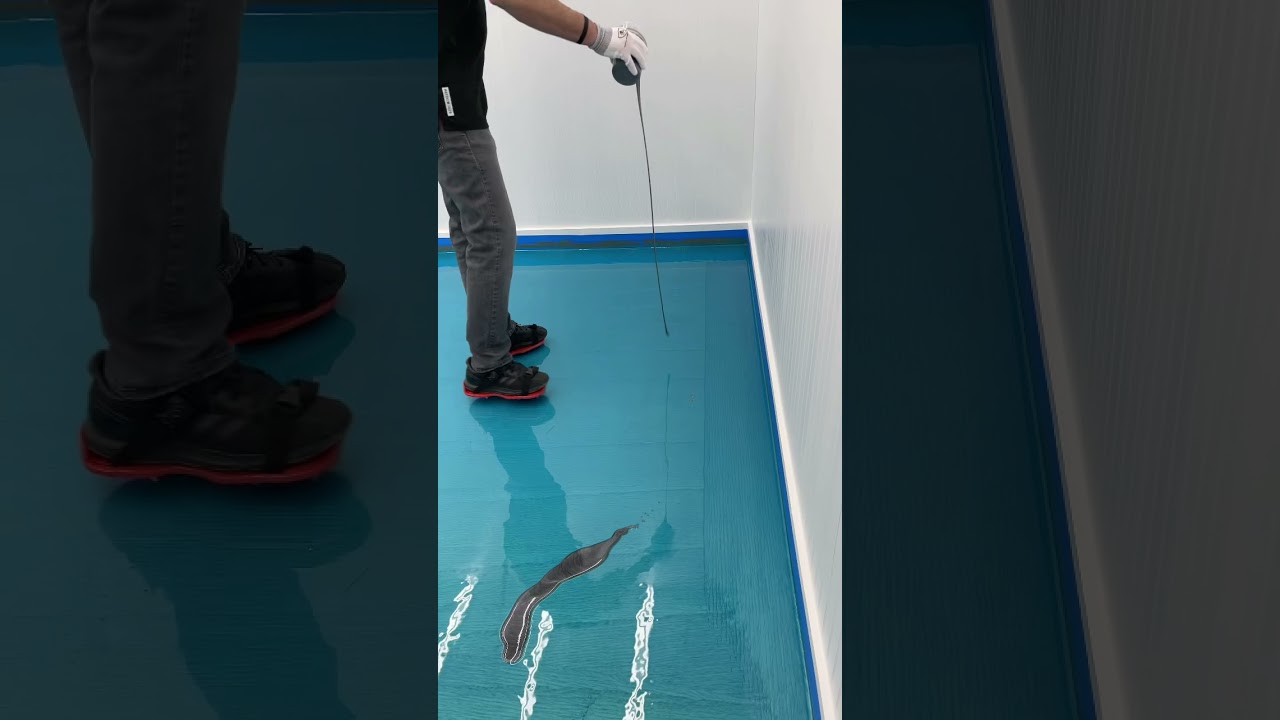Resinous flooring is a cutting-edge solution that effortlessly combines durability, versatility, and aesthetic appeal to revolutionize your space. With its seamless and smooth finish, resinous flooring not only enhances the visual appeal of any room but also provides a long-lasting and low-maintenance surface. Whether you are envisioning a contemporary, sleek look or a vibrant, artistic design, resinous flooring offers an array of customizable options to suit your unique style and preferences. Its resilient nature allows it to withstand heavy foot traffic, chemical spills, and impacts, making it ideal for various environments such as commercial spaces, industrial facilities, and even residential areas. Additionally, its hygienic properties make resinous flooring a popular choice in healthcare facilities, laboratories, and food processing plants, ensuring a clean and safe environment. The application process of resinous flooring is both efficient and time-saving, allowing for minimal disruption to your daily activities. So, if you are seeking a flooring solution that seamlessly blends durability, versatility, and aesthetic appeal, look no further than resinous flooring to transform your space into a stylish and functional masterpiece.

Resinous Flooring: A Comprehensive Overview
| Type | Description | Advantages | Disadvantages |
|---|---|---|---|
| Epoxy Flooring | Epoxy resin-based flooring that consists of a mixture of resins and hardeners, providing a durable and seamless surface. | – Exceptional chemical resistance, making it ideal for industrial use. – High gloss finish enhances aesthetics. – Easy to clean and maintain. – Excellent durability and longevity, withstanding heavy traffic and impact. – Can be customized with various colors, patterns, and textures. | – Requires professional installation. – Sensitive to UV exposure, which may cause discoloration or yellowing over time. – Initial installation cost can be higher compared to other flooring options. |
| Polyurethane Flooring | Polyurethane resin-based flooring that offers excellent durability, flexibility, and resistance to chemicals and abrasions. | – Superior resistance to chemicals, oils, and solvents. – Provides a comfortable and slip-resistant surface. – Can be installed with various thicknesses, allowing for customization based on specific needs. – Offers excellent resistance to thermal shock and extreme temperatures. – Low maintenance requirements. | – Limited color options compared to epoxy flooring. – May require longer curing time before full use. |
| Methyl Methacrylate (MMA) Flooring | MMA resin-based flooring known for its fast curing time, making it suitable for time-sensitive projects. | – Rapid curing process, allowing for quick installation and minimal downtime. – High impact resistance and durability. – Excellent chemical resistance, ensuring longevity in demanding environments. – Can be applied in low temperatures. – Seamless surface prevents the growth of bacteria or mold. | – Strong odor during installation. – Professional installation is necessary due to complex mixing and application process. – Limited color options and design flexibility compared to epoxy flooring. |
“Ocean Blue Epoxy Floor: A Stunning Transformation Unveiled!”
The Benefits of Resinous Flooring
When it comes to flooring options, there are countless materials to choose from. One option that has gained popularity in recent years is resinous flooring. This type of flooring is known for its durability, versatility, and aesthetic appeal. In this article, we will explore what resinous flooring is and why it may be the right choice for your next flooring project.
What is Resinous Flooring?
Resinous flooring refers to a type of flooring system that is made from a combination of resin and other materials. The resin acts as a binder, holding the flooring materials together and creating a strong, seamless surface. There are various types of resinous flooring, including epoxy, polyurethane, and methyl methacrylate (MMA) flooring.
Epoxy flooring is perhaps the most well-known type of resinous flooring. It is a highly durable and chemically resistant option that is commonly used in industrial settings, such as warehouses and manufacturing facilities. Polyurethane flooring, on the other hand, is a flexible and impact-resistant option that is often used in commercial and residential spaces. MMA flooring is a fast-curing option that is commonly used in healthcare facilities and other environments that require a quick installation.
The Advantages of Resinous Flooring
Durability: One of the primary advantages of resinous flooring is its durability. Resinous floors are known for their ability to withstand heavy foot traffic, impacts, and chemical spills. This makes them an excellent choice for high-traffic areas, such as garages, warehouses, and commercial kitchens.
Versatility: Another key advantage of resinous flooring is its versatility. These floors can be customized to meet the specific needs and aesthetics of any space. They come in a wide range of colors, patterns, and finishes, allowing for endless design possibilities. Whether you prefer a sleek, modern look or a more traditional style, resinous flooring can be tailored to suit your preferences.
Seamless Surface: Resinous flooring creates a seamless surface that is not only visually appealing but also easy to clean and maintain. Unlike other types of flooring, such as tile or carpet, resinous floors have no grout lines or fibers that can trap dirt and bacteria. This makes them a hygienic choice for environments that require a high level of cleanliness, such as hospitals, laboratories, and food processing plants.
The Installation Process
Preparation: Before the resinous flooring can be installed, proper surface preparation is essential. This typically involves cleaning, repairing any cracks or imperfections, and applying a primer to ensure proper adhesion of the resinous materials.
Application: The resinous flooring materials are then mixed and applied to the prepared surface. The application process may vary depending on the type of resinous flooring being installed. In some cases, multiple layers may be required to achieve the desired thickness and finish.
Curing: Once the resinous flooring has been applied, it needs time to cure and harden. The curing time can vary depending on the type of resinous flooring and environmental conditions. It is important to follow the manufacturer’s instructions regarding curing time and any specific maintenance requirements during this period.
Conclusion
Resinous flooring is a durable, versatile, and visually appealing option for a wide range of applications. Whether you need a flooring solution for a commercial space, an industrial facility, or a residential property, resinous flooring offers many advantages. Its durability, versatility, and seamless surface make it a practical and aesthetically pleasing choice. If you are considering a flooring upgrade, it may be worth exploring the benefits of resinous flooring for your project.

